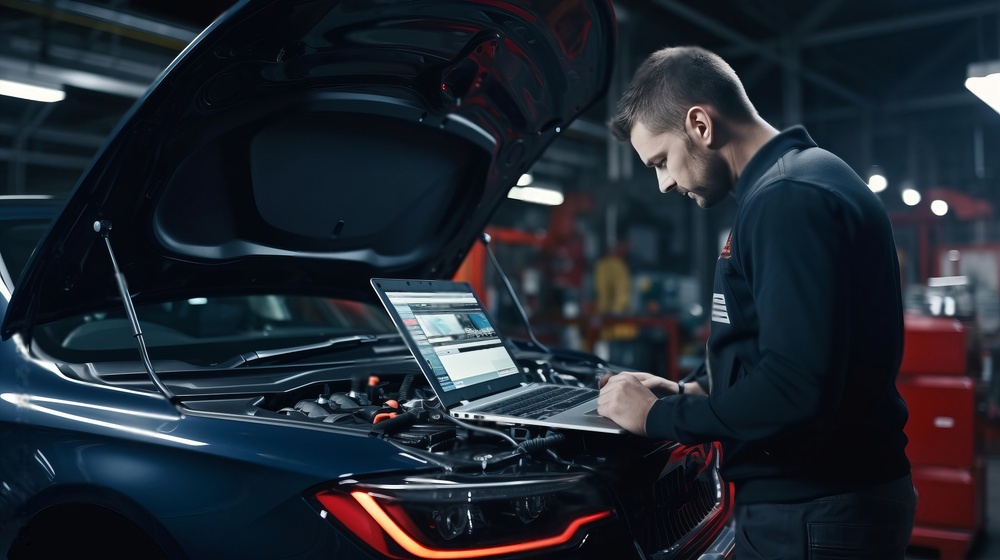
The Path to Automotive Expertise: Auto Technician Courses
In today’s rapidly evolving automotive industry, the demand for skilled auto technicians continues to grow. As vehicles become more complex and technologically advanced, the need for well-trained professionals who can diagnose, repair, and maintain these sophisticated machines is at an all-time high. Auto technician courses offer aspiring mechanics and car enthusiasts the opportunity to gain the knowledge and skills necessary to excel in this dynamic field.
For those considering a career in the automotive industry, auto technician courses provide a solid foundation for success. These comprehensive programs cover a wide range of topics, from basic engine mechanics to advanced diagnostic techniques and emerging technologies. By enrolling in these courses, students can develop the expertise needed to tackle the challenges of modern vehicle maintenance and repair.
Why Choose Auto Technician Courses?
Career Opportunities and Job Security
The automotive industry is a cornerstone of the global economy, and skilled auto technicians are always in high demand. By completing auto technician courses, you’re positioning yourself for a stable and rewarding career with numerous opportunities for growth and advancement. From independent repair shops to dealerships and fleet maintenance operations, the job prospects for qualified technicians are diverse and plentiful.
Hands-On Learning Experience
One of the most significant advantages of auto technician courses is the emphasis on practical, hands-on training. These programs typically feature well-equipped workshops where students can work on real vehicles, gaining valuable experience that directly translates to the workplace. This hands-on approach allows students to develop confidence in their skills and prepares them for the day-to-day challenges they’ll face in their future careers.
Cutting-Edge Technology and Techniques
As vehicles become increasingly sophisticated, auto technician courses evolve to keep pace with the latest advancements. Students learn to work with state-of-the-art diagnostic tools, computer systems, and emerging technologies such as hybrid and electric vehicle systems. This exposure to cutting-edge technology ensures that graduates are well-prepared to handle the vehicles of today and tomorrow.
Core Components of Auto Technician Courses
Engine Mechanics and Powertrain Systems
At the heart of every auto technician course is a thorough exploration of engine mechanics and powertrain systems. Students learn about the fundamental principles of internal combustion engines, including the four-stroke cycle, fuel injection systems, and engine performance optimization. Additionally, courses cover transmission systems, differentials, and drive axles, providing a comprehensive understanding of how power is generated and transmitted throughout the vehicle.
Electrical Systems and Electronics
Modern vehicles rely heavily on complex electrical systems and electronic components. Auto technician courses dedicate significant time to teaching students about automotive electrical systems, including battery technology, charging systems, and starting systems. Students also learn about the intricate electronic control modules that govern various vehicle functions, as well as diagnostic techniques for troubleshooting electrical issues.
Suspension, Steering, and Braking Systems
A crucial aspect of vehicle safety and performance lies in the suspension, steering, and braking systems. Auto technician courses provide in-depth instruction on these critical components, covering topics such as wheel alignment, tire balancing, hydraulic brake systems, and advanced driver assistance systems (ADAS). Students learn how to diagnose and repair issues in these systems, ensuring that vehicles operate safely and efficiently.
Heating, Ventilation, and Air Conditioning (HVAC)
Comfort systems play a significant role in modern vehicles, and auto technician courses include comprehensive training on HVAC systems. Students learn about refrigeration principles, climate control systems, and the proper handling of refrigerants. This knowledge is essential for maintaining and repairing vehicle comfort systems, which are increasingly complex and integrated with other vehicle systems.
Advanced Topics in Auto Technician Courses
Hybrid and Electric Vehicle Technology
As the automotive industry shifts towards more sustainable transportation solutions, auto technician courses are incorporating specialized training in hybrid and electric vehicle technology. Students learn about high-voltage battery systems, electric motors, and the unique safety considerations associated with working on these vehicles. This forward-thinking approach ensures that graduates are prepared to work on the vehicles of the future.
Computerized Diagnostic Systems
Modern vehicles are equipped with sophisticated onboard diagnostic systems that require specialized knowledge to interpret and utilize effectively. Auto technician courses provide extensive training in the use of computerized diagnostic tools and software, teaching students how to read and interpret diagnostic trouble codes (DTCs) and perform advanced system analyses.
Emissions Control and Environmental Considerations
With increasing focus on environmental sustainability, auto technician courses cover emissions control systems and related technologies. Students learn about catalytic converters, exhaust gas recirculation (EGR) systems, and the latest emissions regulations. This knowledge is crucial for ensuring that vehicles meet stringent environmental standards and operate efficiently.
Preparing for Industry Certifications
ASE Certification Preparation
Many auto technician courses are designed to prepare students for industry-recognized certifications, such as those offered by the National Institute for Automotive Service Excellence (ASE). These certifications demonstrate a technician’s expertise in specific areas of automotive repair and maintenance, enhancing their credibility and career prospects.
Manufacturer-Specific Training Programs
Some auto technician courses offer specialized training programs aligned with specific vehicle manufacturers. These programs provide students with in-depth knowledge of particular brands and models, often leading to manufacturer-specific certifications that are highly valued by dealerships and specialized repair shops.
The Future of Auto Technician Courses
Integration of Virtual and Augmented Reality
As technology continues to advance, auto technician courses are beginning to incorporate virtual and augmented reality training tools. These immersive technologies allow students to practice complex repairs and diagnostic procedures in a safe, controlled environment, enhancing their learning experience and preparing them for real-world challenges.
Emphasis on Soft Skills and Customer Service
In addition to technical expertise, modern auto technician courses recognize the importance of soft skills and customer service. Programs increasingly include training in communication, problem-solving, and customer relations, preparing graduates to excel in all aspects of their future careers.
Choosing the Right Auto Technician Course
Accreditation and Industry Recognition
When selecting an auto technician course, it’s essential to consider the program’s accreditation and industry recognition. Look for courses that are accredited by reputable organizations and have strong connections with local employers in the automotive industry.
Facilities and Equipment
The quality of the training facilities and equipment can significantly impact the learning experience. Prospective students should visit the training centers and assess the available tools, vehicles, and technology to ensure they align with industry standards.
Instructor Expertise and Industry Experience
The knowledge and experience of the instructors play a crucial role in the effectiveness of auto technician courses. Research the backgrounds of the teaching staff and look for programs that employ instructors with extensive industry experience and up-to-date certifications.
Key Takeaways on Auto Technician Courses:
- Industry Demand: The automotive industry’s growing complexity has increased the demand for skilled auto technicians, making these courses a gateway to a stable and rewarding career.
- Hands-On Experience: Auto technician courses emphasize practical, hands-on training in well-equipped workshops, providing students with real-world experience that directly translates to the workplace.
- Cutting-Edge Technology: These courses cover the latest automotive technologies, including hybrid and electric vehicles, advanced diagnostic systems, and emerging trends in the industry.
- Comprehensive Curriculum: Programs typically cover a wide range of topics, from basic engine mechanics to complex electrical systems, suspension, steering, braking, and HVAC systems.
- Certification Preparation: Many courses are designed to prepare students for industry-recognized certifications, such as ASE, enhancing graduates’ credibility and career prospects.
- Soft Skills Development: Modern auto technician courses increasingly incorporate training in communication, problem-solving, and customer service skills, preparing students for all aspects of their future careers.
- Future-Focused Training: The integration of virtual and augmented reality tools in some programs reflects the industry’s commitment to adopting innovative training methods, ensuring graduates are prepared for the future of automotive technology.
Driving Your Career Forward
Auto technician courses offer a clear path to a rewarding career in the automotive industry. By providing comprehensive training in both traditional and cutting-edge technologies, these programs equip students with the skills and knowledge needed to succeed in this dynamic field. As vehicles continue to evolve, the role of skilled auto technicians becomes increasingly vital, ensuring that these courses remain a valuable investment in one’s future.
Whether you’re a car enthusiast looking to turn your passion into a profession or someone seeking a stable and engaging career, auto technician courses provide the foundation for success. With the right training and dedication, graduates of these programs can look forward to a fulfilling career at the forefront of automotive technology, keeping the world’s vehicles running smoothly and efficiently for years to come.
How long does it typically take to complete an auto technician course?
The duration of auto technician courses can vary depending on the program and level of certification. Generally, certificate programs may take 6-12 months to complete, while associate degree programs typically last about two years. Some advanced specialization courses or manufacturer-specific training programs might be shorter, lasting a few weeks to a few months. The length of the course often reflects its depth and breadth, with longer programs offering more comprehensive training across various automotive systems and technologies.
Do I need prior experience or knowledge to enroll in an auto technician course?
While prior experience or knowledge can be beneficial, most auto technician courses are designed to accommodate students with varying levels of automotive background. Many programs start with foundational concepts and gradually progress to more advanced topics. However, a genuine interest in vehicles and mechanical aptitude can be advantageous. Some courses may have basic educational prerequisites, such as a high school diploma or equivalent. It’s always best to check with the specific program for their entry requirements and recommendations.
What career opportunities are available after completing an auto technician course?
Graduates of auto technician courses have a wide range of career opportunities available to them. They can work in independent repair shops, dealerships, fleet maintenance facilities, or even start their own businesses. Specialized roles include brake specialist, transmission expert, or electrical systems technician. As they gain experience, technicians can advance to senior positions, become shop managers, or move into related fields such as automotive engineering or technical training. The skills acquired are also transferable to other industries that rely on complex machinery and systems.


